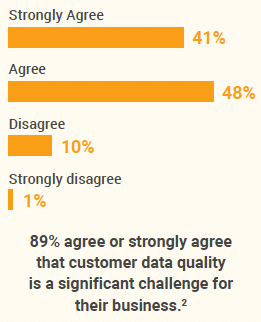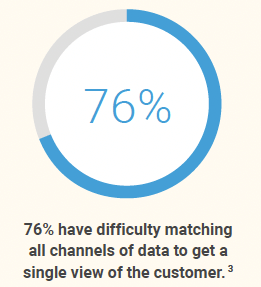European data leaders share their insights
Introduction
As digital engagement accelerates, a shift is occurring from strategies driven by reach, relevance, and frequency to very targeted and customized interactions driven by data.
Customer reference data is the fuel that powers commercial operations. It is essential for increasing field force effectiveness and connecting pharma companies with the right healthcare ecosystems. A robust data foundation and governance is also a prerequisite for taking full advantage of digital channels.
But recent research shows that the majority of life sciences companies don’t yet have the right data foundation for their digital transformation. Most (78%) are planning data enhancement initiatives to tackle common challenges such as data quality, speed, and integration.1
Three data leaders share their data management challenges and their innovative approaches for accelerating digital transformation.
CONTRIBUTORS

Koen Janssens, associate director for field force effectiveness at Norgine, a leading European specialist pharmaceutical company bringing transformative medicines to patients for over a century.

Marc Jenny, customer engagement systems and advanced analytics strategy lead, International & Japan, at Alexion, a global biopharmaceutical company focused on developing life-changing therapies for people living with rare disorders.

Damien Caldy, director of strategy for OpenData at Veeva, a leader in cloud-based software and data for the global life sciences industry.
How do you see the shift to more personalized HCP engagement playing out? What are the challenges?
KOEN JANSSENS: There is dramatic change occurring in the pharma world. Before the pandemic, we were already transitioning from the more classical ‘frequency and coverage’ approach towards the more complex world of account management and digitalization. During COVID, HCPs and HCOs have also had to accelerate their digital processes. How we engage with them now at Norgine is determined by their stage in the digital journey.
DAMIEN CALDY: In the pre-digital era, success was measured by ‘share of voice’ and often relied on the sheer scale of a company’s salesforce, budget, and physical presence. Today, there is a shift to much more targeted and personalized interactions with HCPs. It is a positive development but cannot happen without a data-driven mindset, new tools, and accurate customer data at every stage of the engagement process to ensure impactful interactions.
MARC JENNY: It’s been a very fast-paced switch to digital interactions, but at least the whole industry has had to go through this rapid change together. At Alexion, we were in a fortunate situation from a data management and data privacy perspective. We had already started to capture consent for electronic messaging and digital channels before the pandemic. Having a good foundation already in place helped us through the transition.
“We have a digital tsunami at the moment, and ultimately, we need to balance out face-to-face versus digital. That is our biggest challenge – finding the right balance.” Koen Janssens Norgine

How strategic is customer reference data for your business?
MARC JENNY: Accurate customer data is foundational as there are so many back-end processes that depend on it. It is vital for field force efficiency and effective targeting as well as for aspects of data privacy, compliance, and patient safety.
KOEN JANSSENS: We work in a cross-functional environment, so our customer data is the heart of our company. It’s essential for customer engagement, especially when it involves digital interactions where data generally drives personalization and actions.
DAMIEN CALDY: Our recent survey of data leaders in Europe showed that the vast majority (91%) of pharma companies see customer data as a strategic global asset. But, with only half of the respondents believing that they have the right data foundation and governance to fully support digital transformation2, more work remains before data becomes truly embedded in commercial pharma operations.
How important is data quality, and how do you govern it effectively?
DAMIEN CALDY: Most companies cite customer data quality as a significant challenge, leading to an industry-wide focus to improve it. To reach and maintain the highest data quality standards requires a combination of the right automation, people, and processes consistently applied across regions. Accurate data is foundational for effective digital engagement. When it is not under control, the whole transformation effort is at risk.
KOEN JANSSENS: Our customer data is the central source for all our activities, so it is crucial that all information is centralized, checked, and validated. Poor data quality can create a lot of collateral damage because if you are delivering the wrong product or service to the wrong people, it ultimately affects patients.
At Norgine, mastering data quality turned into a strategic focus that we initiated by switching to Veeva OpenData.
MARC JENNY: Two years ago, we took the strategic decision to improve our data processing while replacing our legacy data provider. We switched to Veeva OpenData as well as Veeva Network MDM as our customer master to achieve end-to-end customer data integration across our systems with a single solution provider. We now get access to data we can trust in real-time, which is a huge benefit.
But it is more than a one-time integration project. We also added our own KPIs on top to measure data quality. We track these daily, implement corrective measures where necessary, and optimize the data further to meet our business needs.
“Data quality can impact patient lives, so you need to be mindful of the responsibility that you carry.” Marc Jenny, Alexion
Veeva OpenData provides comprehensive and accurate customer reference data to support pharmaceutical commercial sales execution, compliance, and business analytics.
How important is the speed of data access and data change requests (DCRs) for your field reps as they engage with HCPs?
MARC JENNY: Data correctness is the most critical factor for successful engagement, but data access and speed of DCRs are both a close second. When our field force raises a DCR after a visit with a doctor, they expect it to be validated before they follow up with that HCP or send out an approved email.
KOEN JANSSENS: There’s a clear need for speed. If our reps need to add a new doctor, they need the data to be validated quickly. And that is what they get with OpenData. For example, when we go to a new customer group or are building an account management plan, we are working in the same HCO on a daily basis. So, we need to add contacts quickly and have them validated within at least two days.
It is also essential for end-users to have trust in their database; that the moment they need information on a doctor, they can find it. When we visited the OpenData Research Center in Budapest, we saw the large group of data stewards responsible for validating the database every day. This transparency gave us confidence in the system.
DAMIEN CALDY: Industry response times for processing DCRs are improving but are still averaging four days which is double the duration that companies would like to see.
At Veeva, we are using AI technology and machine learning to cut this time down to an average of five hours. With further innovation, we believe we can make this process close to real-time. We are also using advanced data management techniques to detect, validate, and propagate data changes proactively—in more than 90% of cases before the CRM users and field reps are even aware of the changes. This ultimately drives user adoption.
Veeva Network simplifies master data management and provides deep insights to boost engagement and compliance—across all channels and around the globe.
What is the business benefit of integration in your data strategy?
MARC JENNY: We used to have a very complex infrastructure with multiple vendors, which often meant no one taking responsibility to fix data issues as they arose. That’s why we decided to go for an end-to-end solution. Now that we have Veeva’s OpenData, Network, and CRM, conversations are no longer around data issues; we discuss solutions collaboratively together. It is a very successful partnership.
We have also connected our customer data to other systems. And, when an account manager sees recent updates in the CRM immediately propagated in other systems (like expenses), it builds trust.
KOEN JANSSENS: We are centralizing data management and already starting to see the advantages. The main benefit of OpenData is that our medical, market access, marketing, and commercial teams are now all pulling information from the same source. We are speaking the same language.
DAMIEN CALDY: Siloed data has become a bottleneck for digital projects because ad-hoc data integration is time-consuming, error-prone, and resource-intensive. With seamless integration, a single view of the customer is embedded in the rep’s CRM experience bringing clear benefits to their productivity.

What were the main goals of your data improvement initiatives, and what recommendations would you give to maximize success for this type of project?
KOEN JANSSENS: Our goal in switching from a legacy database to Veeva OpenData was to have an accurate, clean database that we can use to promote our messages and our products more effectively to a targeted audience. Before we switched, we were a little concerned about finding all our customers again in our CRM, but Veeva guided us well.
My advice is to start with a strong, global CRM lead, do a roll-out in one or two countries (ideally a big country and a smaller country), and involve your end-users early in the process. This increases their buy-in and builds positivity towards the system.
MARC JENNY: My recommendation would be to avoid ‘big bang’ approaches. We gained agility and could adjust along the way because we divided our project into multiple phases. By the end, we had deployed in over 40 countries worldwide, across all time zones.
It is also vital to get early buy-in from key business stakeholders and build their trust by providing complete transparency into the end-to-end data quality process.
Learn more about the power of integrated customer data in this video about launch excellence at ADVANZ PHARMA.
2 Veeva 2020 European Customer Reference Data Survey
3 Veeva 2020 European Customer Reference Data Survey